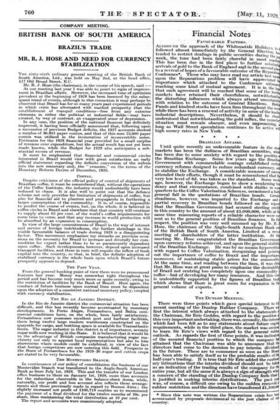BRAZILLAN AFFAIRS.
Until quite recently an unfavourable feature in the markets has been the dullness of Brazilian securities, w has been due to some anxiety with regard to the position the Brazilian Exchange. Some few years ago the Brazil' Government with commendable courage established ce currency reforms designed to' reduce redundant currency, to stabilize the ExChange. A considerable measure of su, attended their efforts, though it must be remembered that very low level of 6d. was taken as the standard. Some wee ago, however, the Exchange began to show a weakening t deny and that circumstance, combined with dislike in so quarters to the Coffee Valorization Schemes, occasioned a fa general fall in the quotations of Brazilian bonds. Gres steadiness, however, was imparted to the Exchange and partial recovery in Brazilian bonds followed on the repo that the- Brazilian Government had secured sterling c in this country to the amount of about £5,000,000, while at same time reassuring reports of a reliable character were rent as to the general position of Brazilian finances. In t respect, the position was very well summed up by Mr. R. Hose, the chairman of the Anglo-South American Bank a of the British Bank of South America, Limited at a meeting of shareholders of the latter institution. At meeting Mr. Hose congratulated the Brazilian Govemm upon currency reforms achieved, and upon the general stabi of the Brazilian Exchange. He was by no means hypererit' with regard to Coffee Valorization, recognizing and point' out the importance of coffee to Brazil and the impo moreover, of maintaining stable prices for the commodity At the same time, and reading between the lines, it was el that Mr. Hose was at great pains to emphasize the desirabilit of Brazil not centring too completely upon one commodity coffee—but of developing her many resources. And this v. is undoubtedly supported by the figures of Brazilian t which shows that there is great room for expansion in general volume of exports.
* * * * THE DUNLOP MEETING.










































 Previous page
Previous page